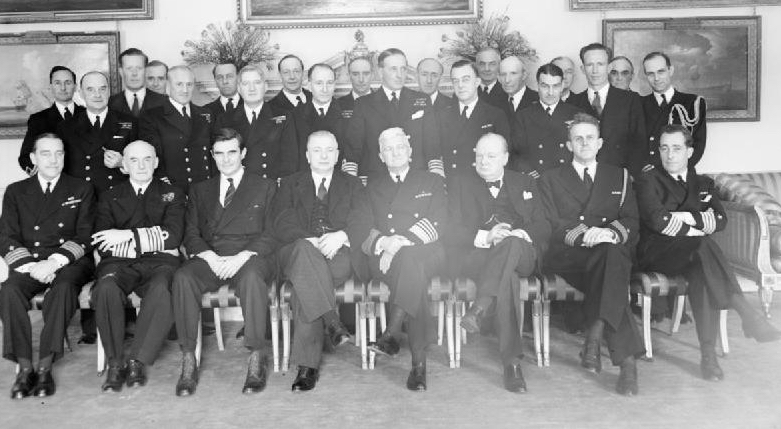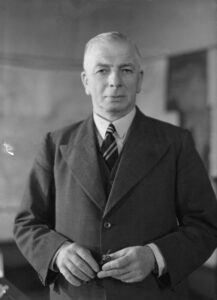
Churchillisms: Puddings Without a Theme
Excerpted from “Take This Pudding Away—It Has No Theme,” written for the Hillsdale College Churchill Project. For the original article with endnotes, click here. To subscribe to weekly articles from Hillsdale-Churchill, click here, scroll to bottom, and enter your email in the box “Stay in touch with us.” We never spam you and your identity remains a riddle wrapped in a mystery inside an enigma.
Puddings (not all desserts) that lacked a theme
A columnist and former presidential advisor asks us to confirm Churchill’s rejection of a tasteless pudding (generic word for dessert in Britain). “It has no theme.”
While not actually published under his byline, Churchill sometimes used the expression when dining. Along with puddings, he applied it to soups. I asked the late Lord Soames: What gave a pudding a theme? “I think,” he replied , “Sir Winston referred to a distinctive flavour or ingredient.”
What I didn’t expect, researching the phrase in the Hillsdale College database of WSC’s published words, was that Churchill used the theme line politically. And more than once. I found five occurrences, each illustrating what he thought about the flaws of legislation or leaders.
1935: the India Bill
A concentrated dose of Churchillian vocabulary poured forth on the Government of India Act. Some analogies were a bit strained, but his word-pictures were vivid. The Act granted more autonomy to the provinces. It also provided for a federation with the “princely states,” and increased the franchise sevenfold.
The historian Zareer Masani said it might have let to a united independent India, but Hindu-Muslim rivalries made that politically impossible. Aware of this problem, Churchill argued against the legislation:
[W]hat is this India Home Rule Bill? I will tell you. It is a gigantic quilt of jumbled crochet work. There is no theme; there is no pattern; there is no agreement; there is no conviction; there is no simplicity; there is no courage. It is a monstrous monument of shams built by the pygmies….
The faithful, trustworthy Indian police, the mainstay of peace and order, are to be disturbed and harassed by divided allegiances arising from unsure, irrational compromise. The supreme government of India is to be racked by Dyarchy—rival authorities clutching at the levers of power.
Churchill’s efforts were ultimately in vain, but his magnanimity was evident after the Act passed. Through a mutual friend, he advised Gandhi “to use the powers that are offered and make the thing a success.”
1939: Napoleon versus Hitler
Churchill always deprecated comparisons between the great French emperor and “a squalid caucus boss and butcher.” In 1939 he wrote:
There is no question of comparing the present ruler of Germany with Napoleon…. Hitler can traverse in his aeroplane, in a few hours, distances which Napoleon’s coach, with all its special relays, could scarcely cover in twice as many days. One of Hitler’s mechanized divisions could certainly disperse all the armies Napoleon ever led. Hitler can add a nought or two to most of the figures with which Napoleon dealt.
1940: Third Reich
Churchill was one of the first to identify Hitler for what he was. And, unlike Napoleon, in WSC’s 1940 language, Hitler’s Reich had no theme:
It is the rule of the Herrenvolk—the master-race—who are to put an end to democracy, to parliaments, to the fundamental freedoms and decencies of ordinary men and women, to the historic rights of nations; and give them in exchange the iron rule of Prussia, the universal goose-step, and a strict, efficient discipline enforced upon the working-classes by the political police, with the German concentration camps and firing parties, now so busy in a dozen lands, always handy in the background. There is the New Order.
Napoleon in his glory and his genius spread his Empire far and wide. There was a time when only the snows of Russia and the white cliffs of Dover with their guardian fleets stood between him and the dominion of the world. Napoleon’s armies had a theme: they carried with them the surges of the French Revolution.
But Hitler—Hitler has no theme, naught but mania, appetite and exploitation. He has, however, weapons and machinery for grinding down and for holding down conquered countries which are the product, the sadly perverted product, of modern science.

1946: “Vague palimpsest of officialese”
Albert Victor Alexander had served as First Lord of the Admiralty in Churchill’s wartime coalition. Alexander was a socialist, but there was affection between them. In 1945, Alexander became Minister of Defense in the new Labour government. Even so, Churchill insisted, he could not have written a document (the Defence White Paper) without a theme:
I must again remind the House that the Rt. Hon. Gentleman used very hard language about the arguments of his political opponents the other night, and about their style. No more barren, dismal, flatulent, platitudinous documents than his White Paper—if you can call it “his” White Paper—has ever been laid before the House of Commons.
His friends—and I am certainly a wartime friend—hope that it is to his credit that he had nothing to do with writing it. It was one of those rigmaroles and grimaces produced by the modern bureaucracy into whose hands we have fallen—a kind of vague palimpsest of jargon and officialese, with no breadth, no theme and, above all no facts.
1949: Nature of a new threat
Speaking at a dinner given by Henry Luce, Churchill revived his belief that Nazism had no theme save racial supremacy. Communism, by contrast, did. And that made it an even more formidable challenge than Hitler:
We are now confronted with something which is quite as wicked but much more formidable than Hitler, because Hitler had only the Herrenvolk stuff and anti-Semitism. Well, somebody [WSC was referring to himself] said about that—a good starter, but a bad stayer. That’s all he had. He had no theme.
But these fourteen men in the Kremlin have their hierarchy and a church of Communist adepts whose missionaries are in every country as a fifth column, and not only a fifth column, in your country, ours, everywhere, and so on, with a feeling that they may be running a risk but if their gamble comes off they will be the masters of the whole land in which they are a minority at the present time. They will be the Quislings with power to rule and dominate all the rest of their fellow countrymen. Therefore they have a good prospective advantage.
In a way, the late conservative leader William F. Buckley, Jr. shared this concept: “My thought has always been that Nazism had absolutely no eschatology,” he told me years ago. “It would wither on the vine. Only the life of Hitler kept it going, and I can’t imagine he’d have lasted very long. The Communists hung in there [after the war] for forty-six years.” (In the context of the 1930s, I respectfully disagreed.)
Words for our time?
It is interesting how Churchill consistently relied on a favored phrase in his oratory. But the remarks above involved issues long past.
Now comes what he said about the lack of “theme” in the 1930 Socialist government. It is remarkable how close this seems to certain situations today:
[T]his island and this Empire are passing through a period of eclipse which may well be converted into a period of decline. There is anxiety abroad, and can we wonder at it! Why should the Government complain? Look at all they have said. Look at all they protest they stand for….
They have no theme [and] have deluded the masses of their supporters in the country into believing they are about to bring into being some vast, splendid, new world. They have climbed and ensconced themselves upon the structures of Capitalism, and they are shouting to the mob below that they are going to pull them down….
Can they wonder there is confusion and anxiety abroad in the nation; and can they wonder that the electors are showing an increasing reluctance to entrust the task of restoring confidence to a bankrupt Government…?
The British electors spoke last on July 4th. Of course, history doesn’t repeat.
Related reading
“William F. Buckley , Jr.: A True Churchillian in the End,” 2020.
“Zionism, Bolshevism, Enemies of Civilization: What Churchill Said,” 2021.
“Coming: New Churchill Phrase Index in My Next Quotebook,” 2024.
“All the Quotes Winston Churchill Never Said,” Part 1 of four parts, 2018.






